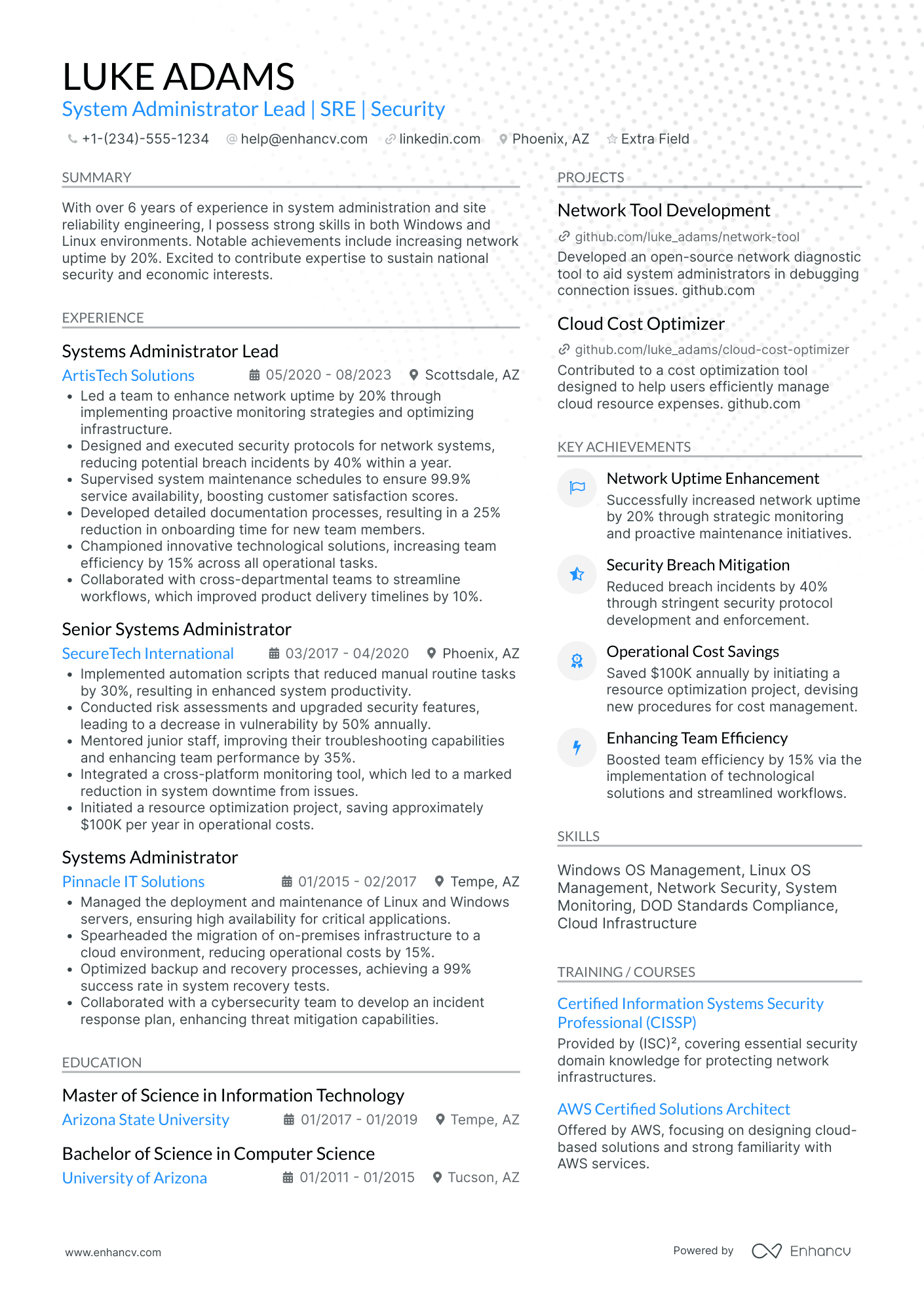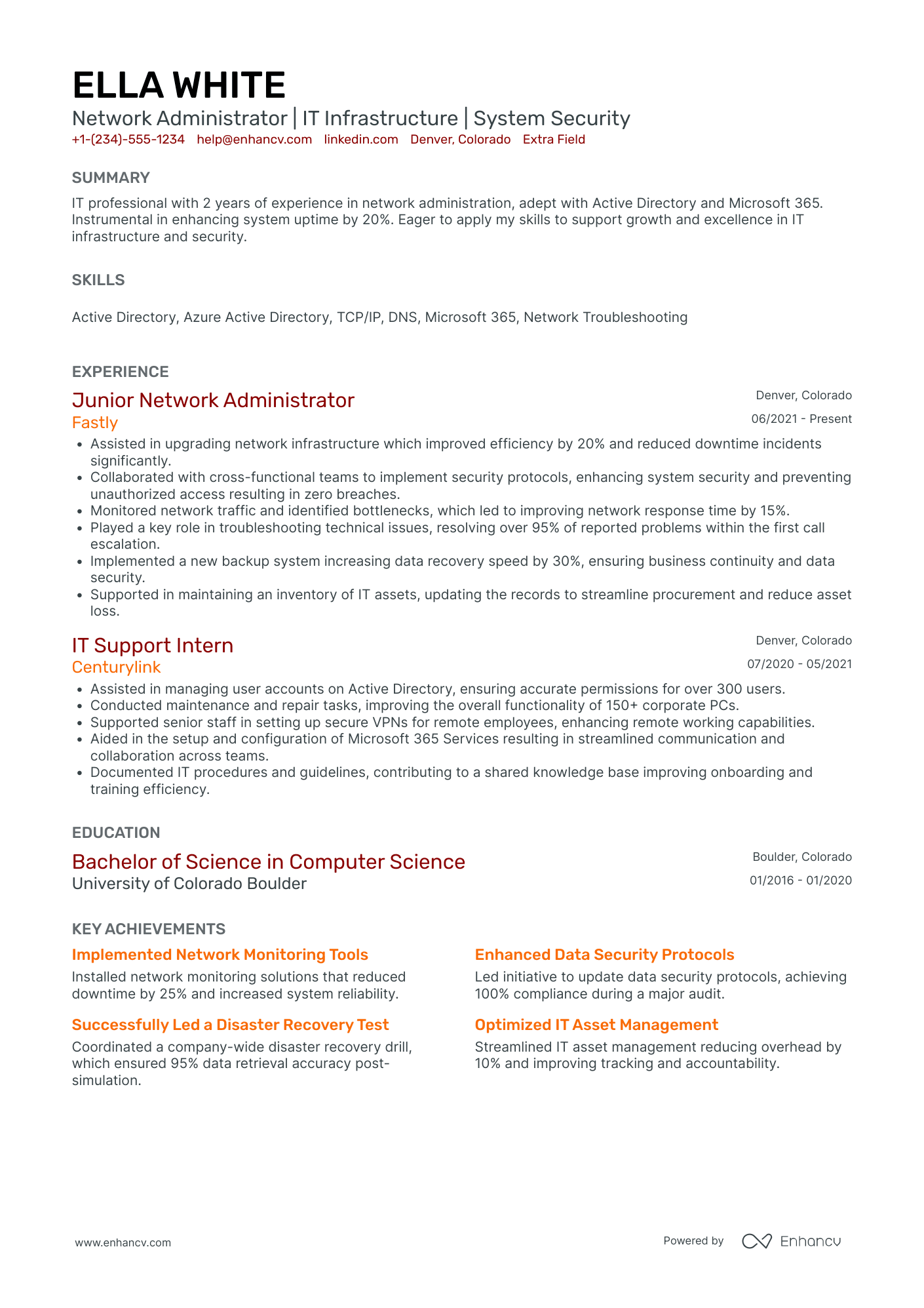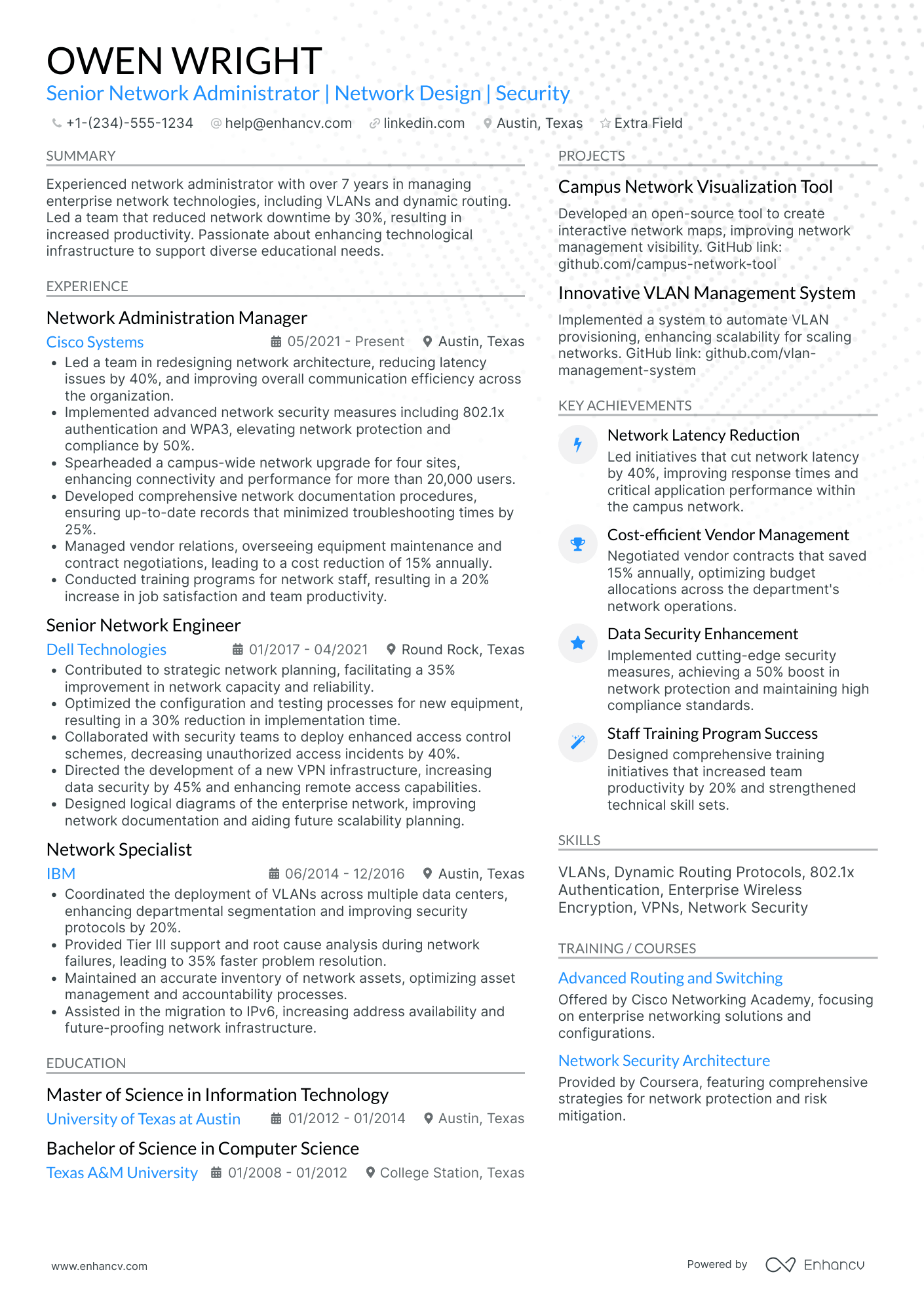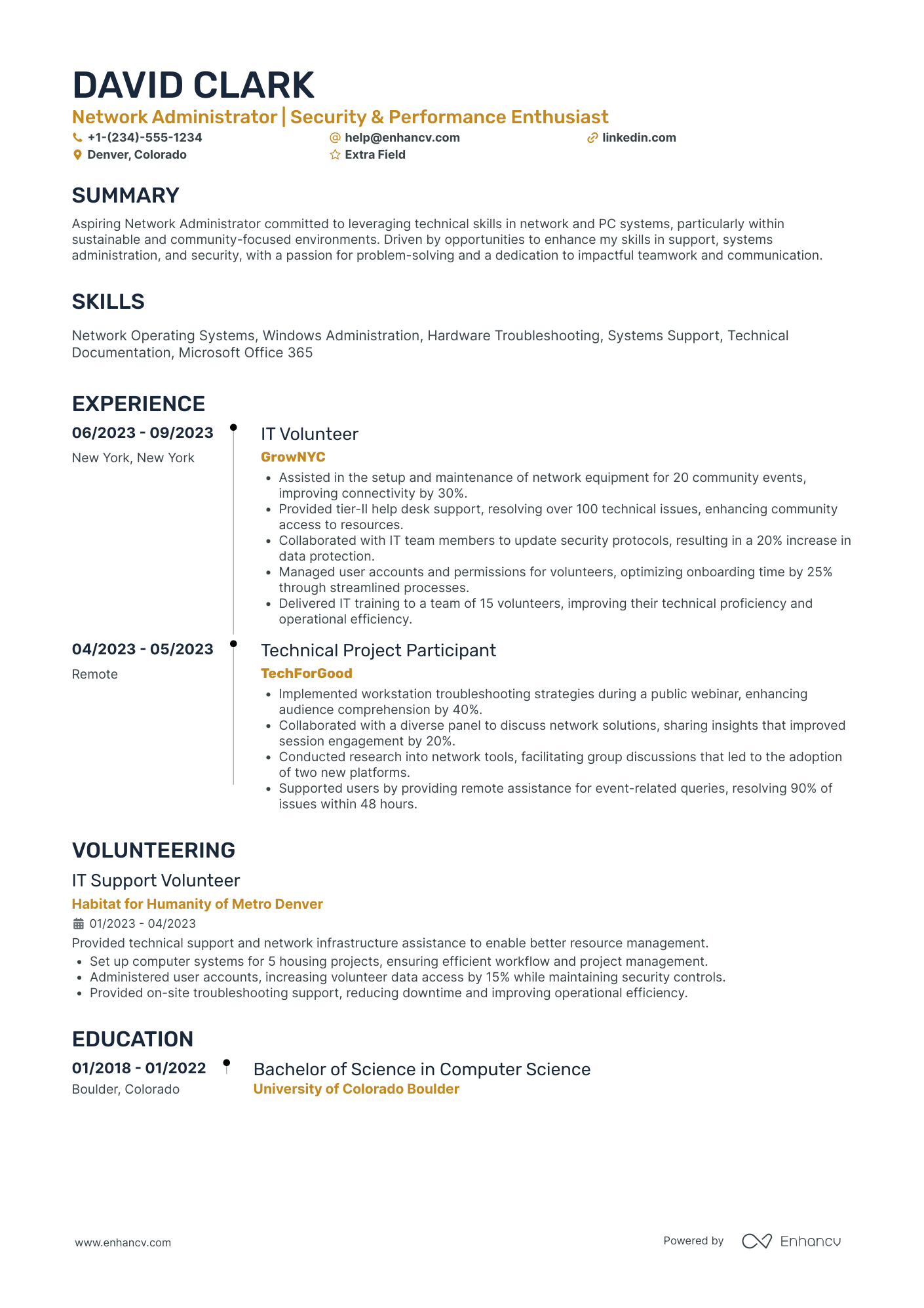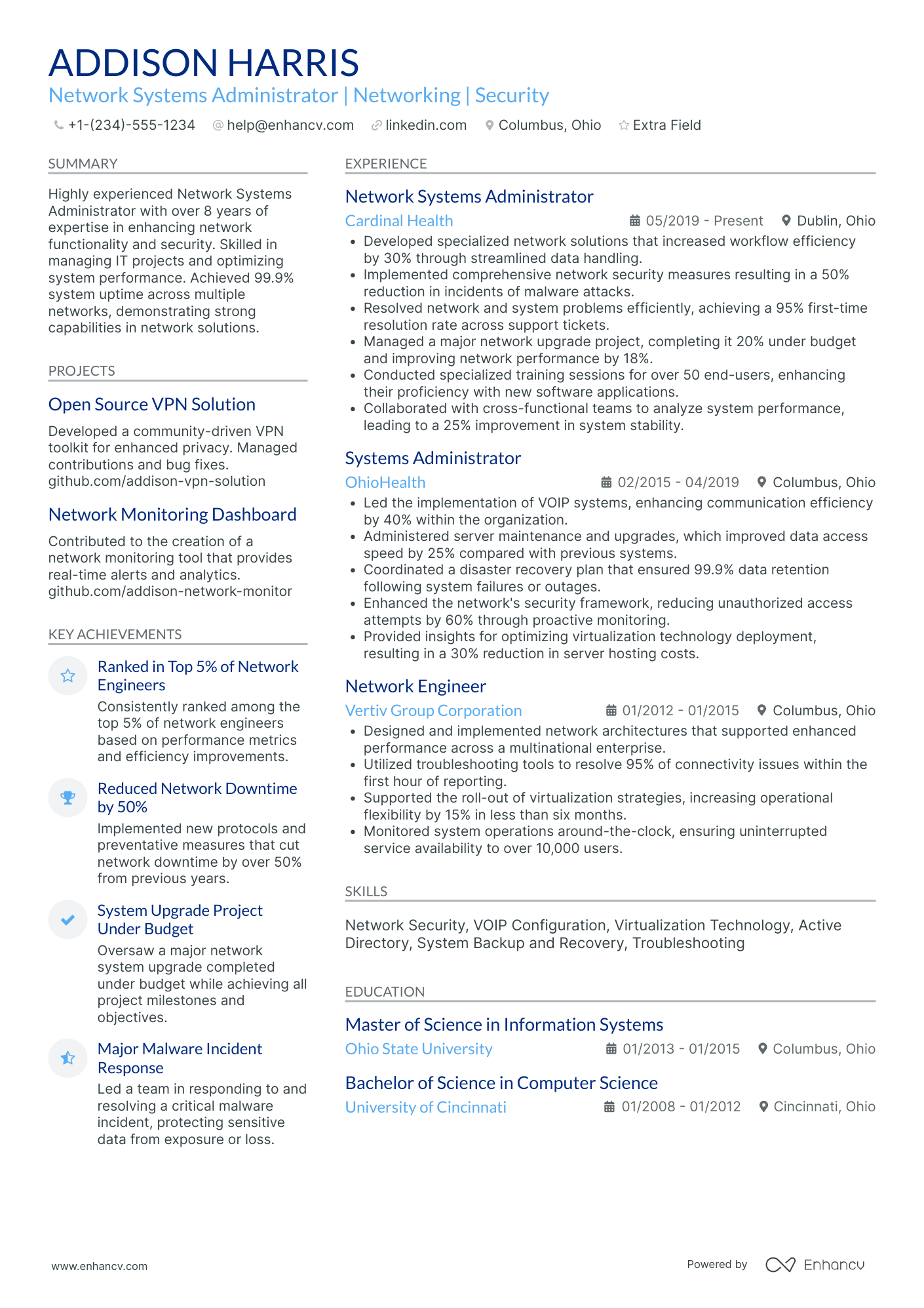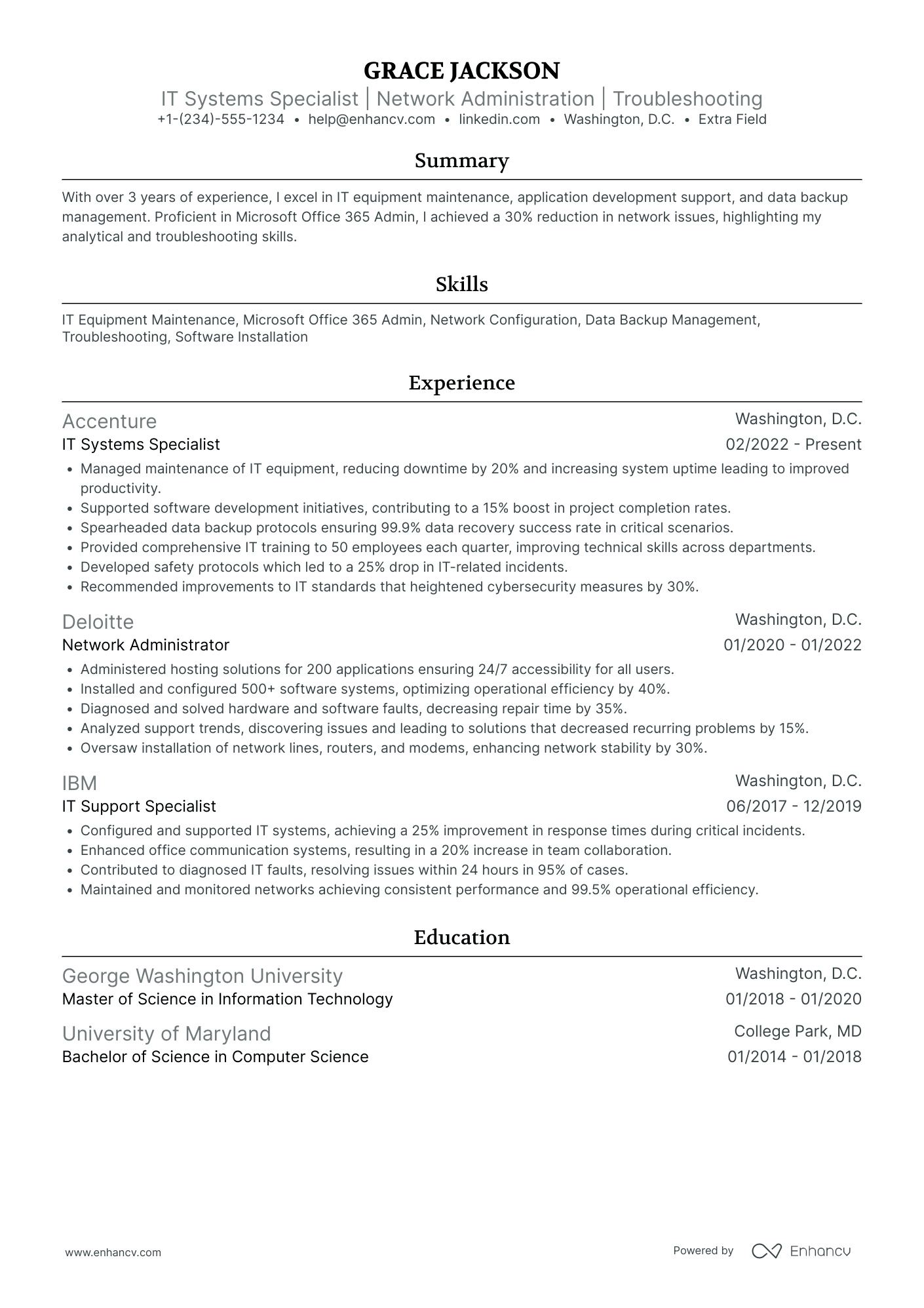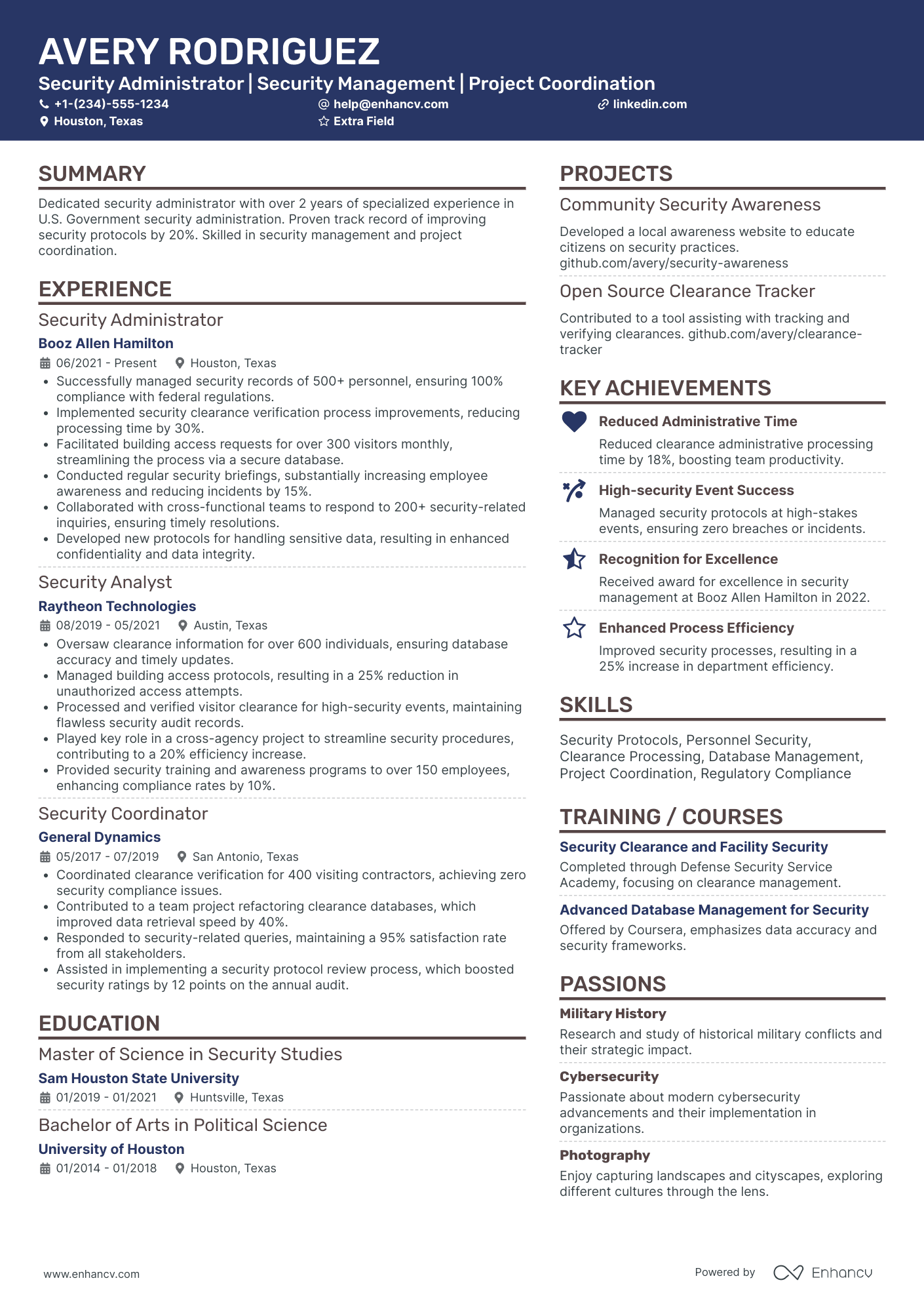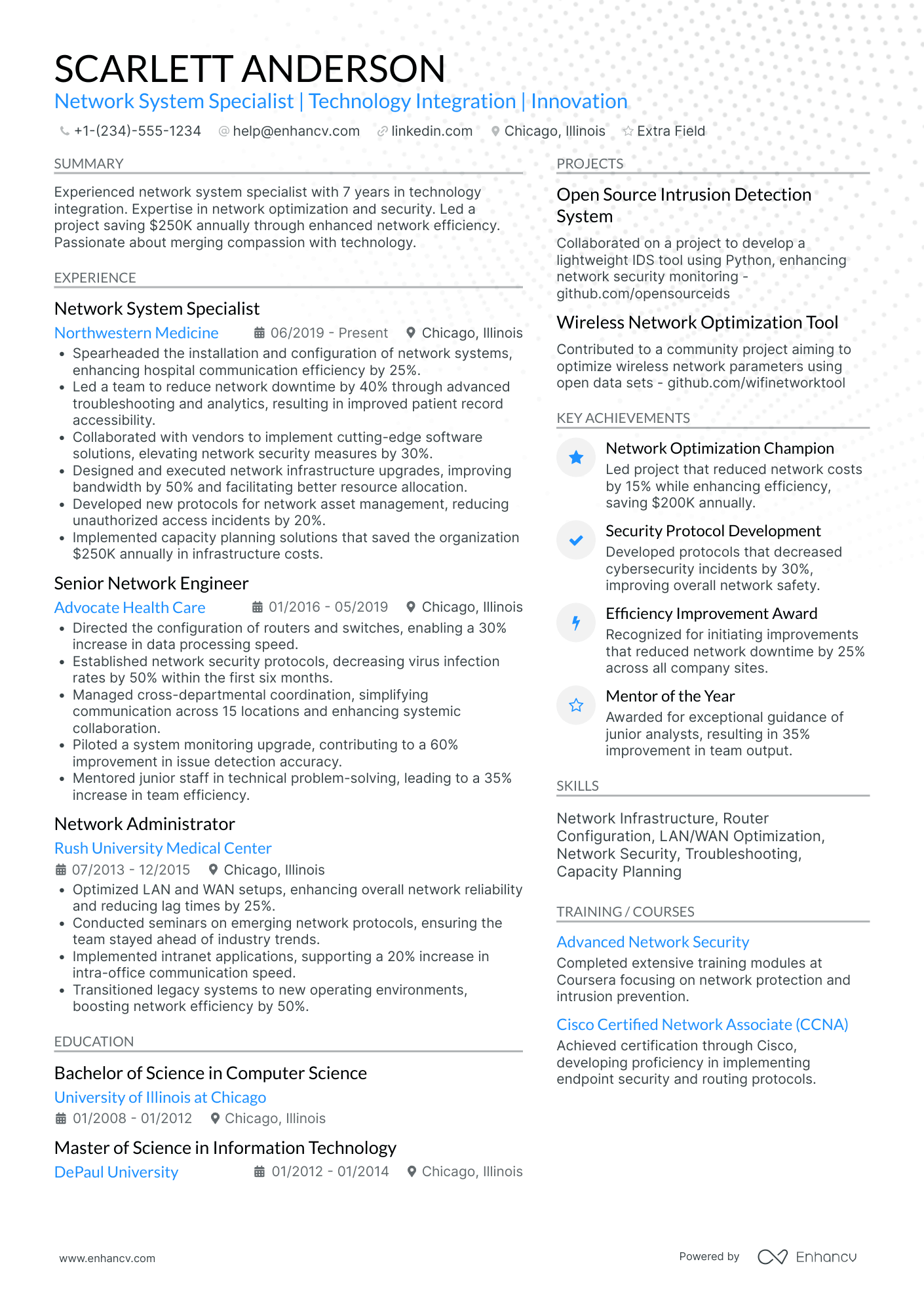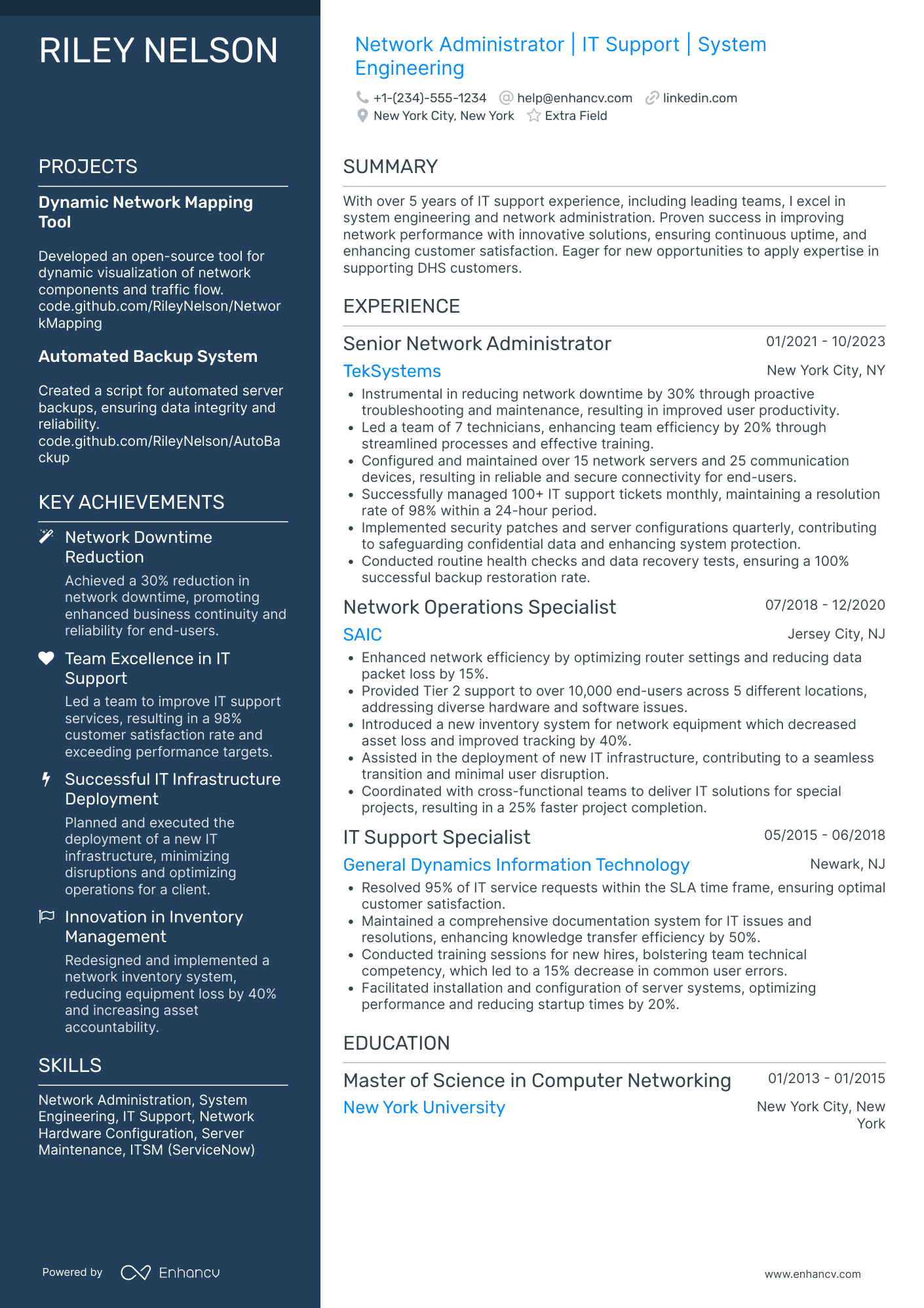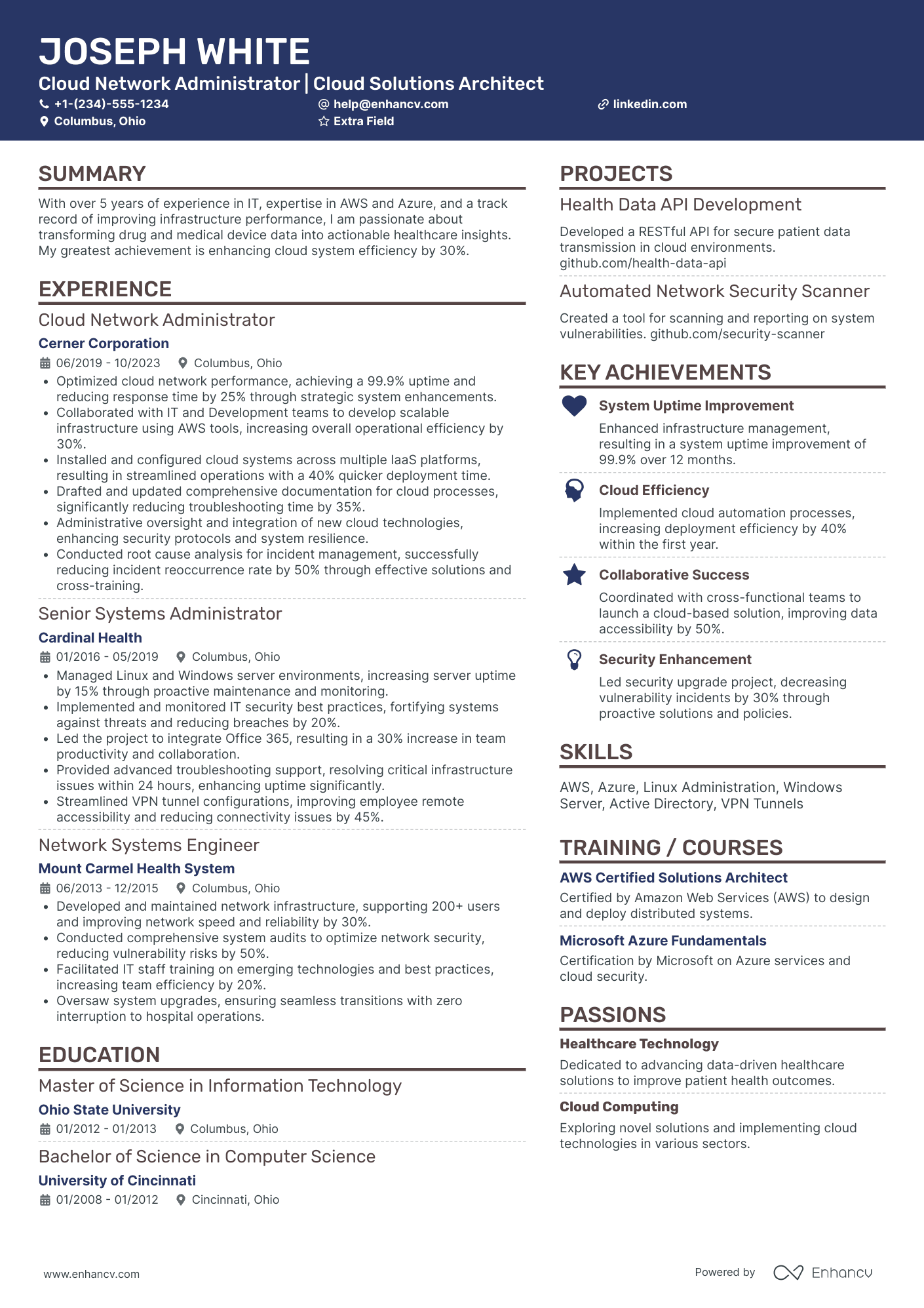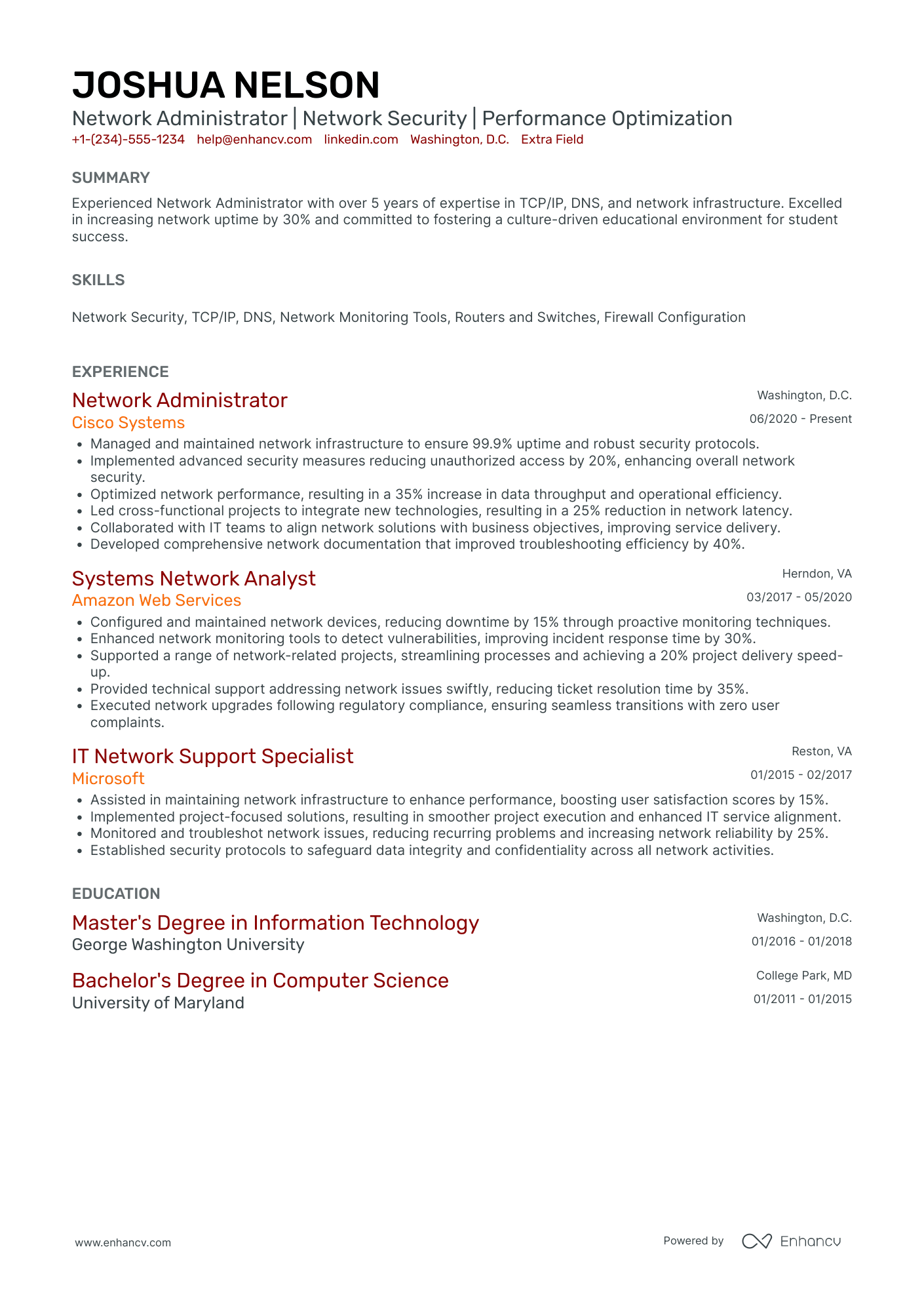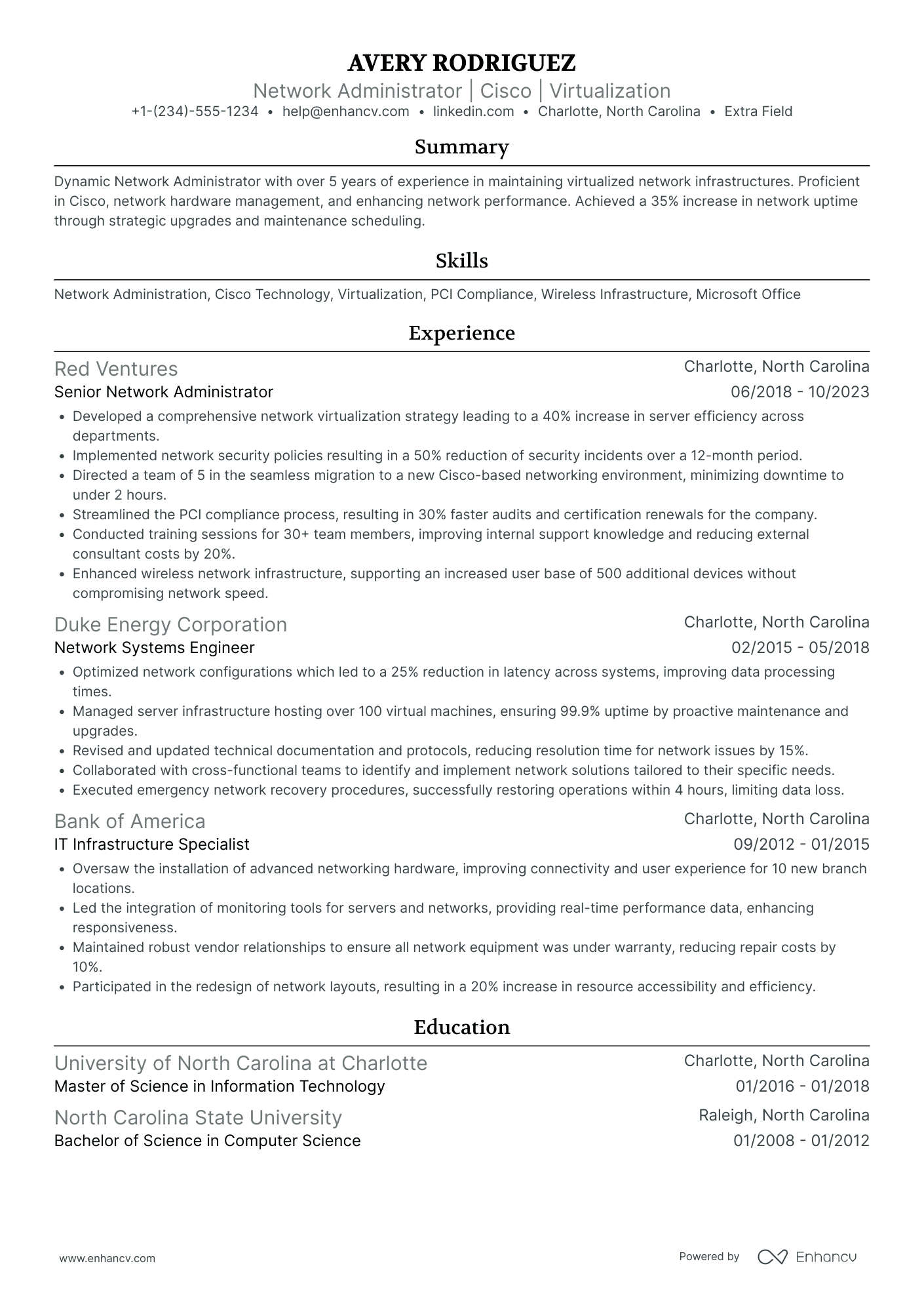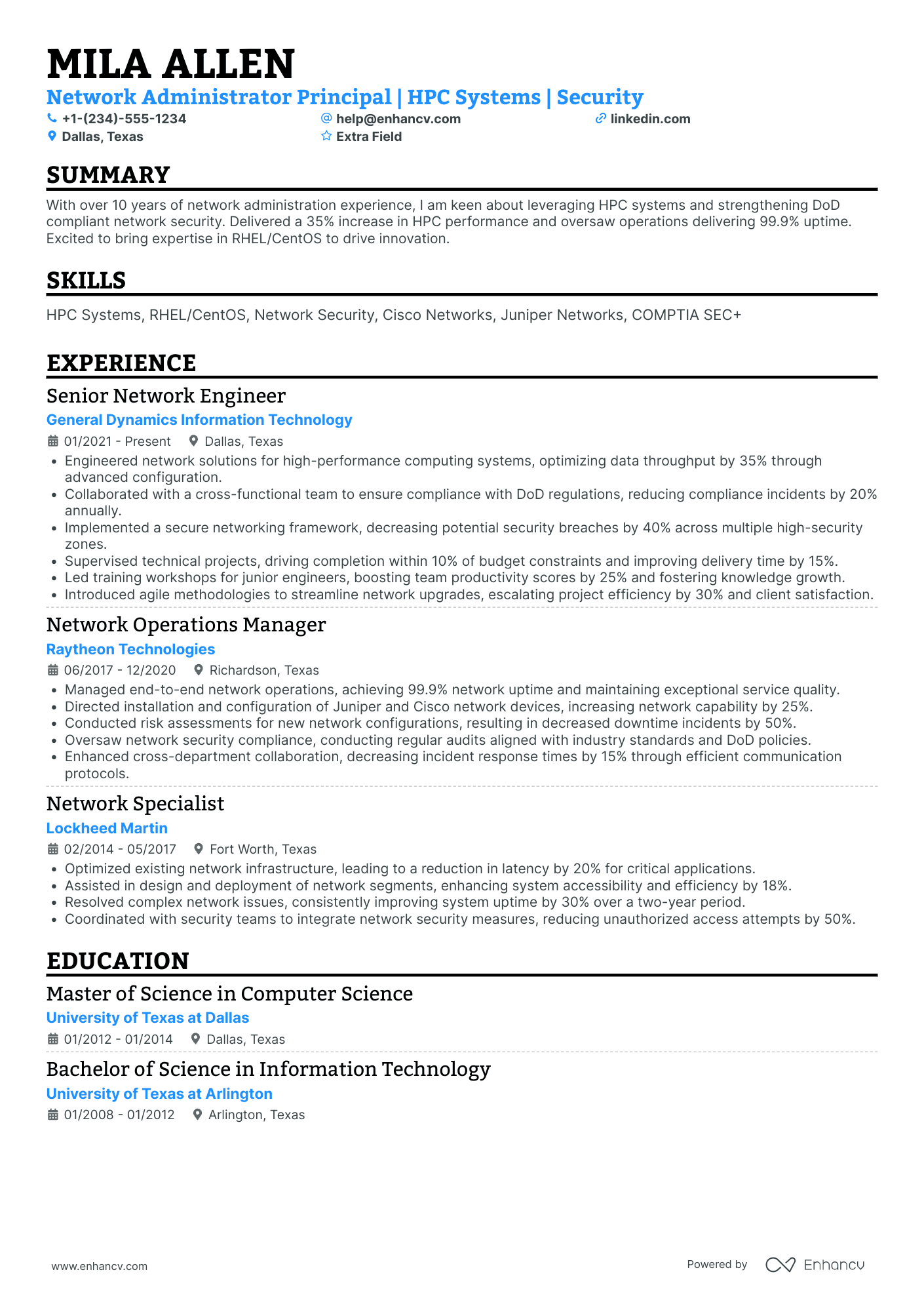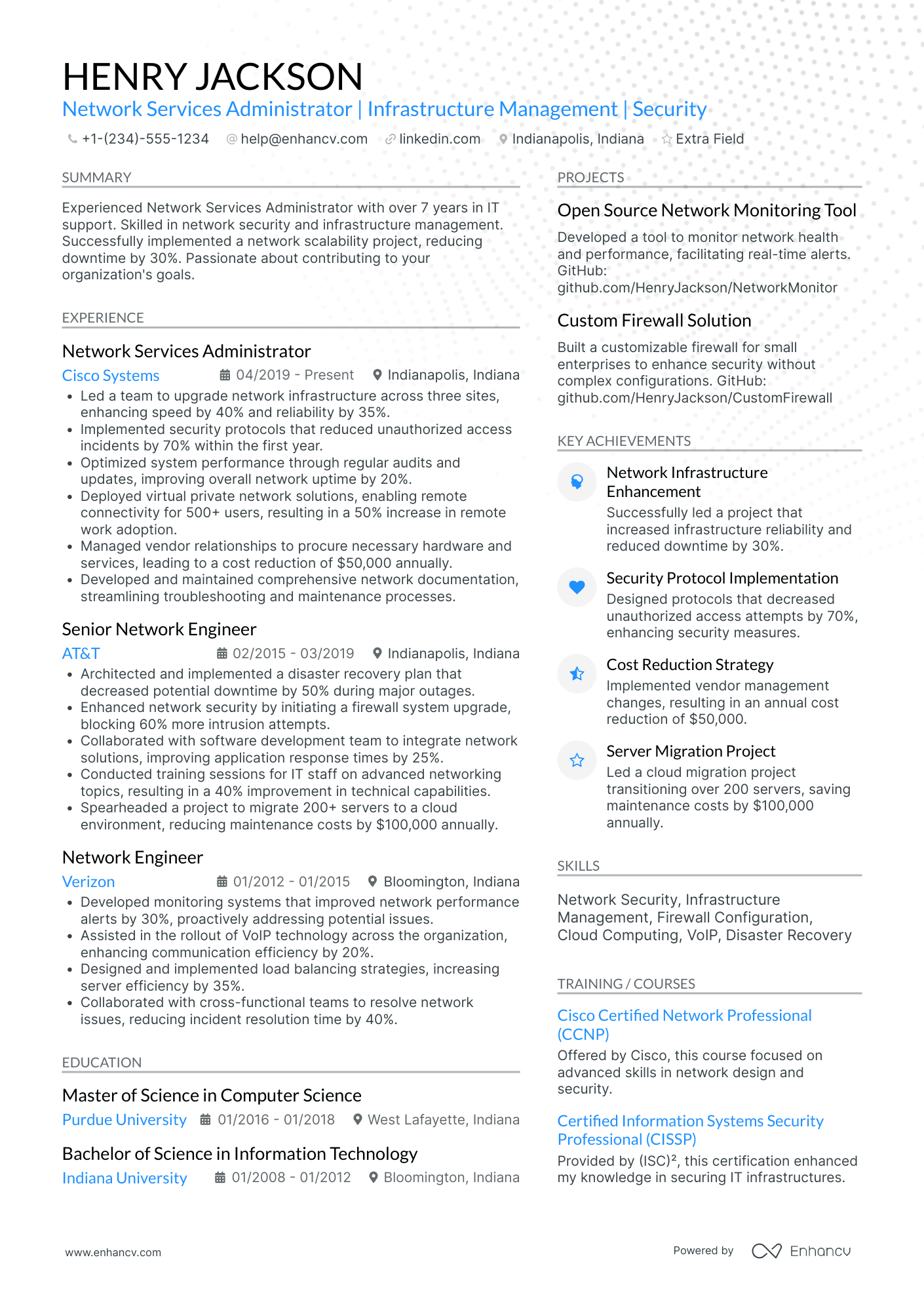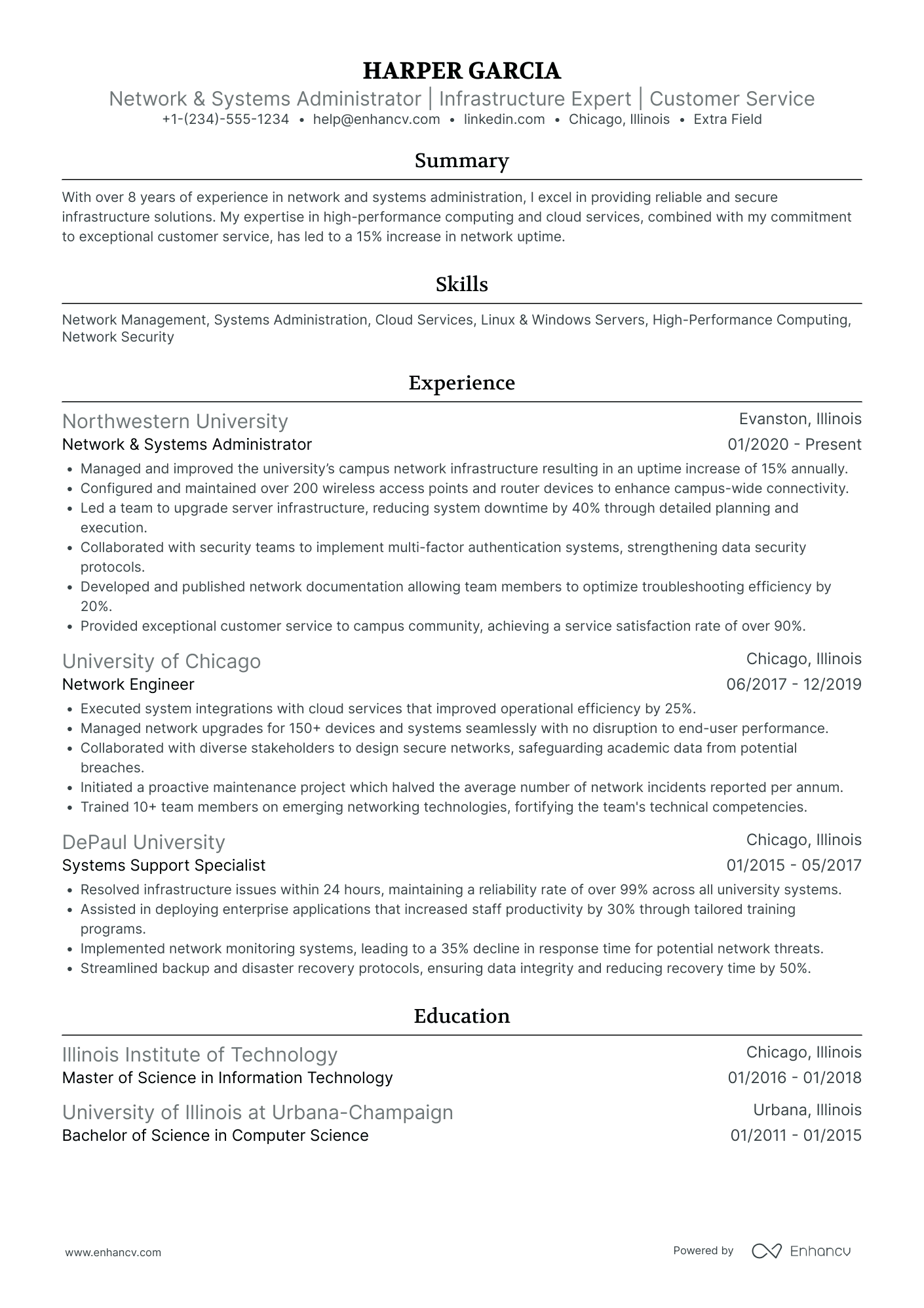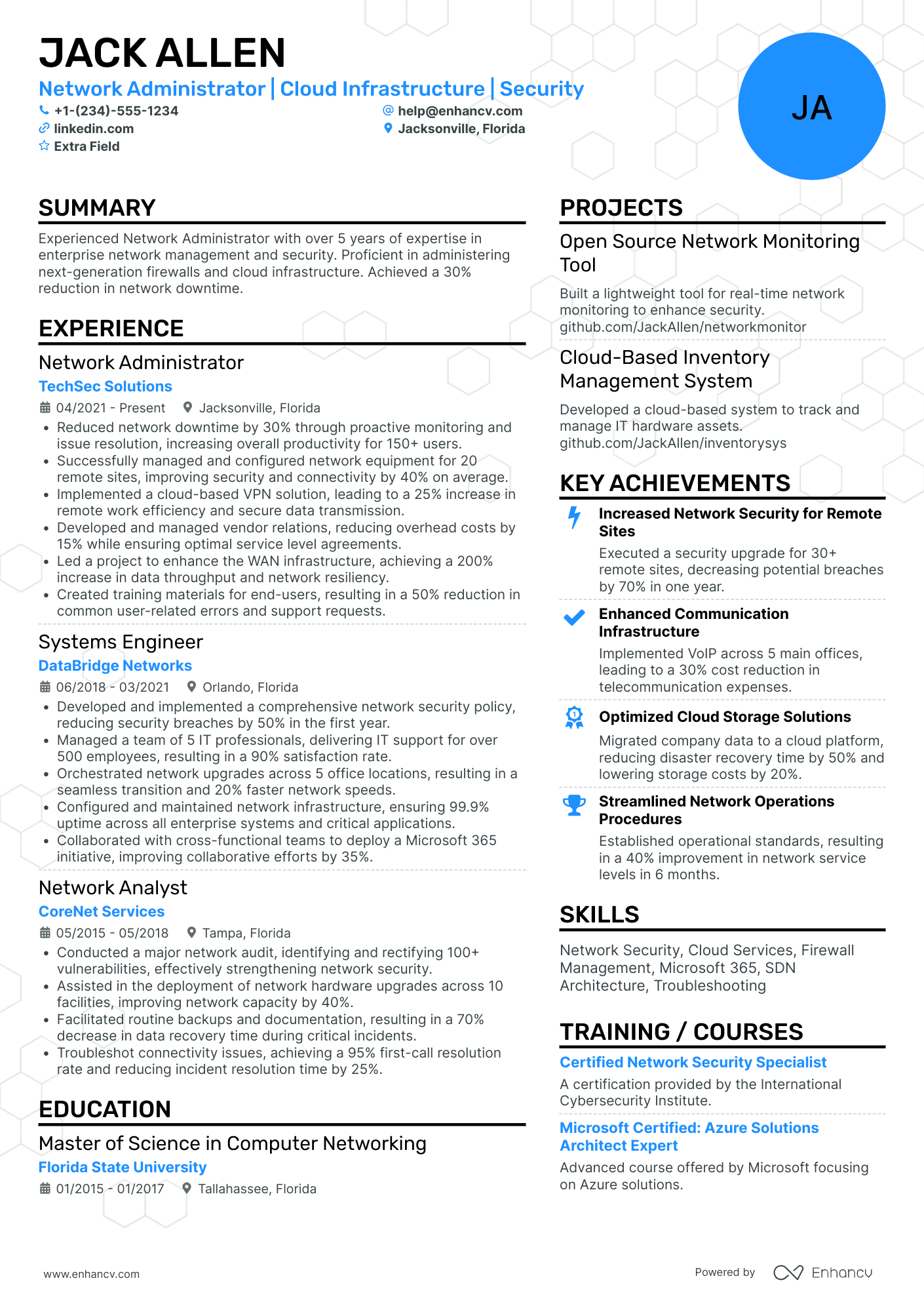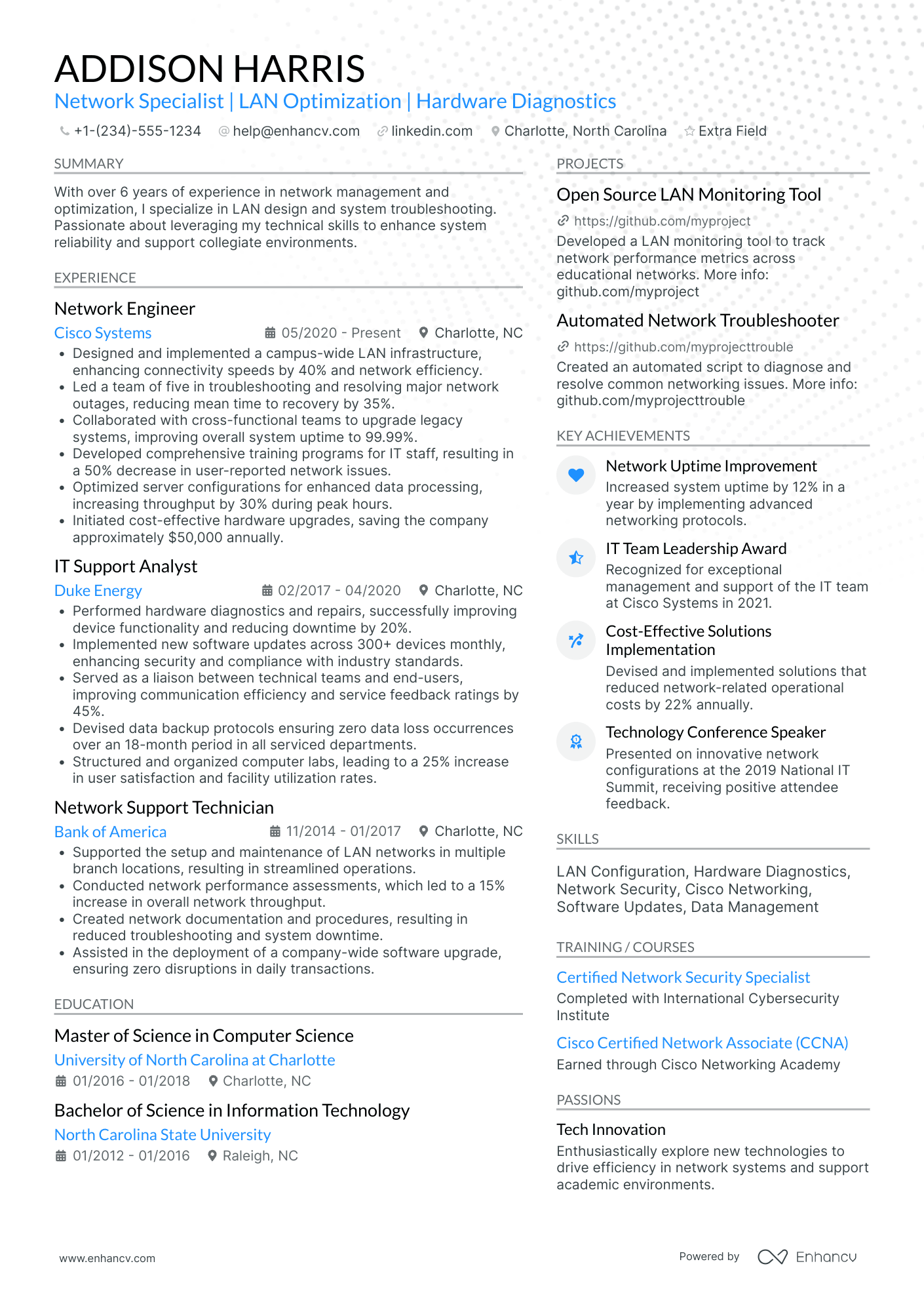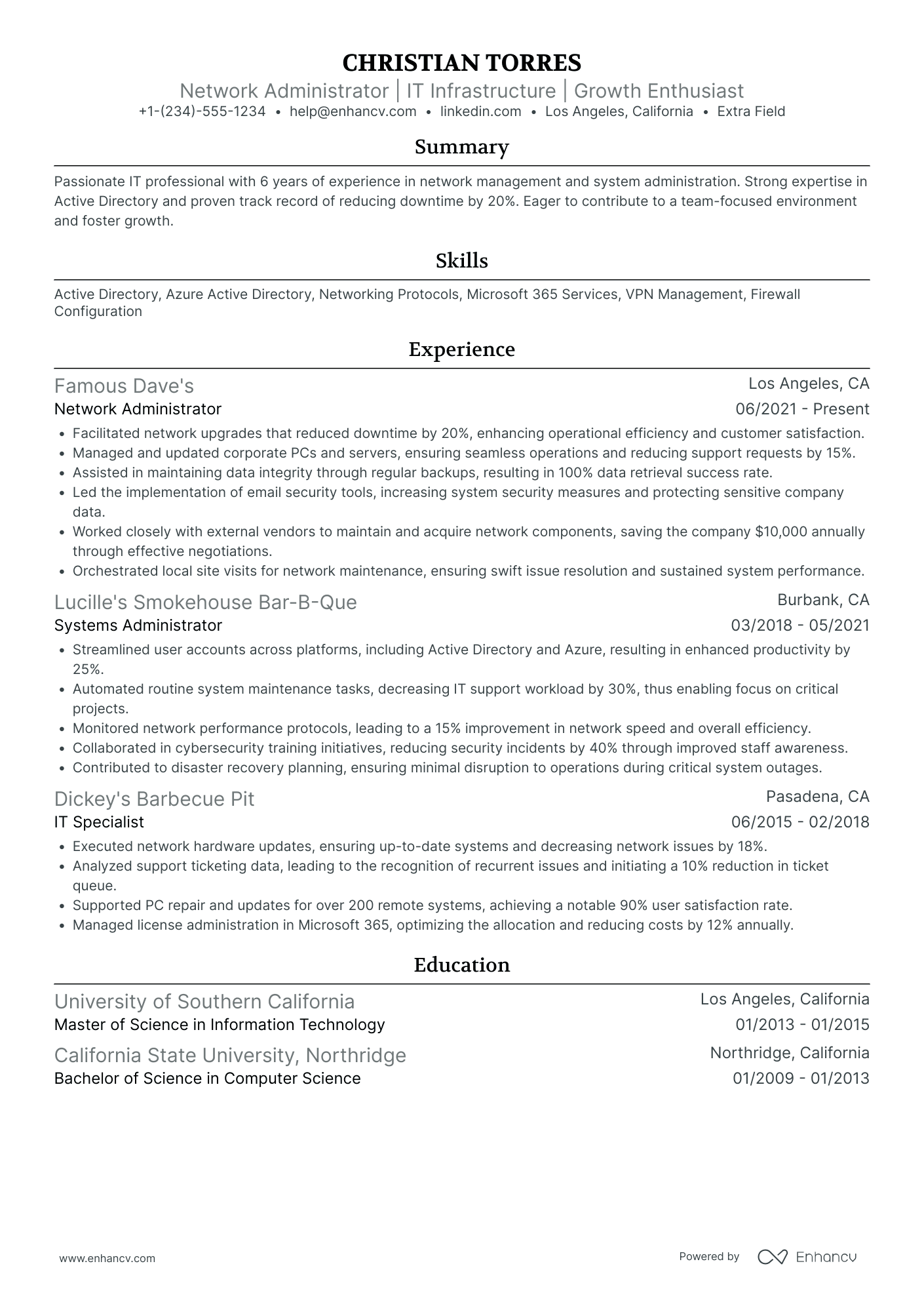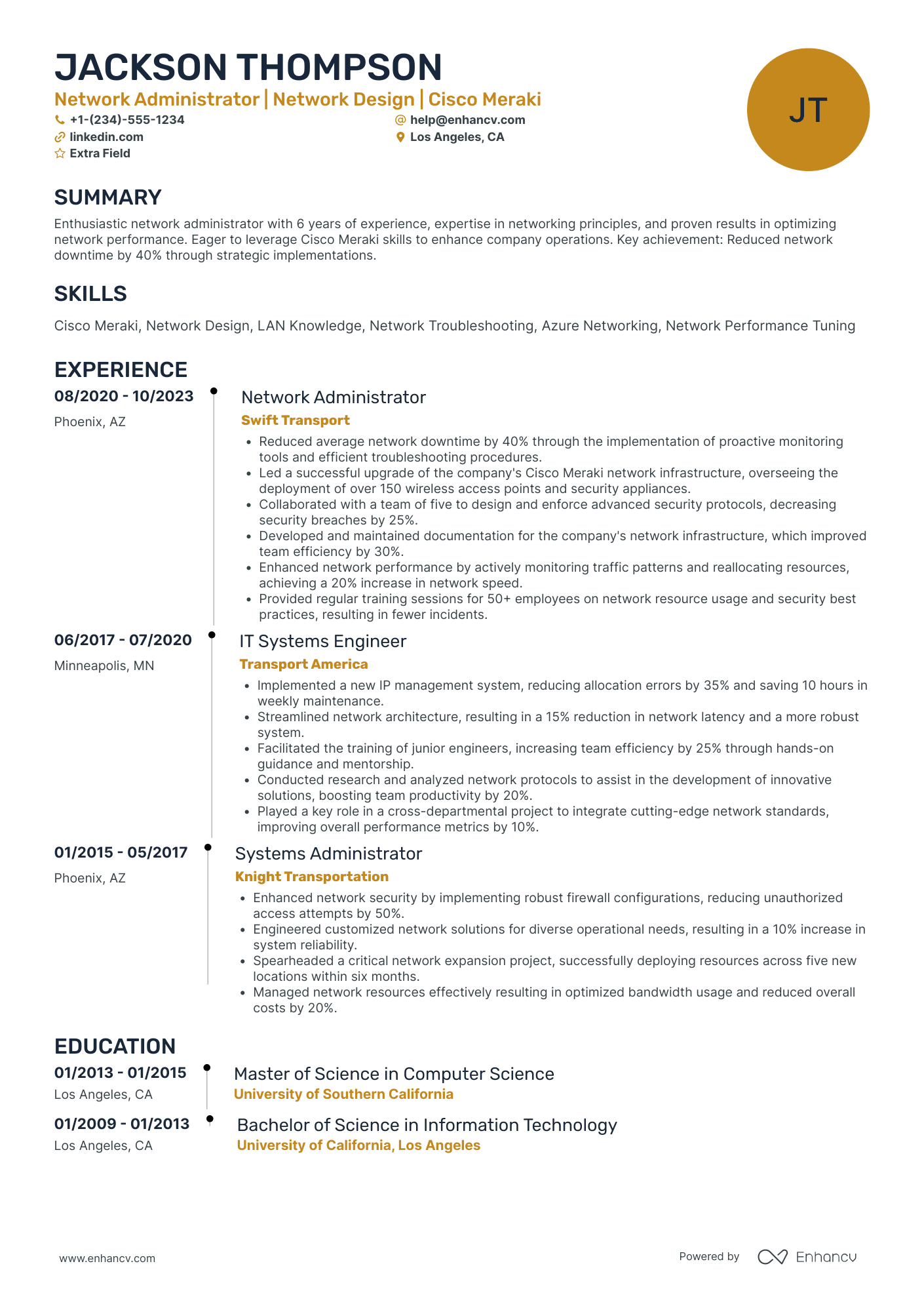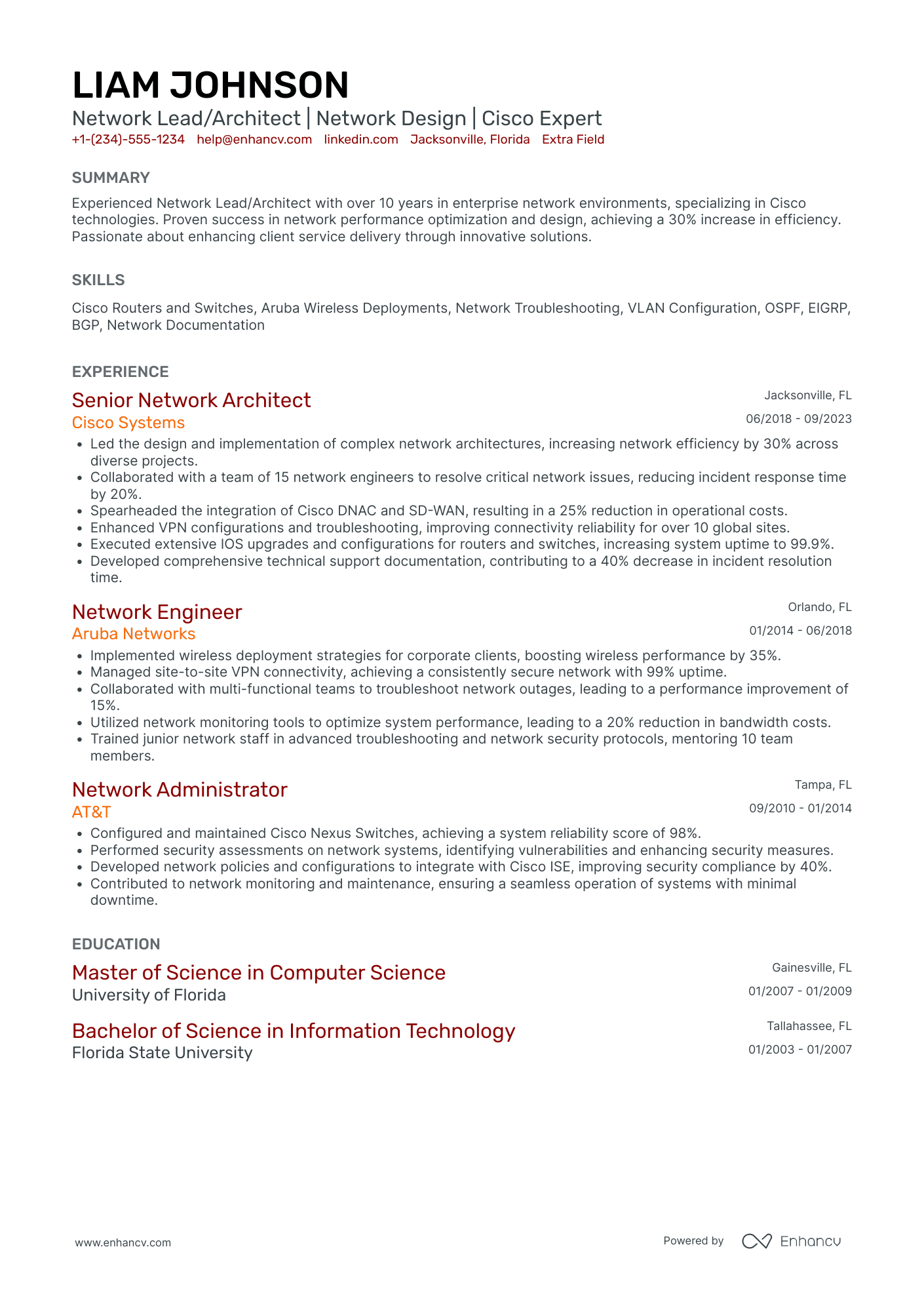Meet Alice.
She’s the Head of HR at a leading software company in your city.
Alice needs to hire a new network administrator to join her team.
Working for this company means you get a competitive salary, free lunches, opportunities to take courses, and tons of paid time off.
This is the dream job. Getting to do what you’re good at, maintaining computer network systems, with tons of cool perks that come along with it.
You’re confident that you’re the one for this role.
You know your way around networks, servers, and hardware like the back of your hand.
It’s all about proving that to Alice now.
She’ll be the one who will pick up your resume and spend a few seconds scanning it before making a judgment call on you.
Your resume has to be up to scratch to make it to the next round for an interview.
That’s what this guide is for. We’ll help you write a network administrator resume that has recruiters and hiring managers eager to speak with you.
Let’s get started.
What you will learn from this network administrator resume guide:
- The importance of tailoring your resume for every job you apply for
- How to stand out from the sea of applicants using real-life accomplishments
- The technical and soft skills that recruiters want to see in your resume
Looking for related resumes?
How to land a job with your network administrator resume
You’re the backbone of a company’s technology system.
No one can conduct business unless everything is running smoothly.
It’s your job to ensure that everything is operating correctly, efficiently, and without any security breaches.
Your job as a network administrator is essential for business success.
That’s why network administrators are one of the most in-demand workers in the tech industry.
Since it’s such a high demand position, more and more network administrators are entering the workforce.
That means more competition for landing the top jobs.
Your resume needs to make an instant impact to stand out from the other candidates.
The first thing that hiring managers are looking for is relevant experience.
They have a list of essential day-to-day operations that they need taking care of, and they’re looking for the right candidate who can complete these without issue.
For that reason, tailoring your resume for every job you apply for will put you at a huge advantage.
Imagine this.
There’s a job posting for a network administrator position at a company that develops innovative technologies for their high-profile clients.
They need someone who can provide support to their clients directly, as well as work generally on team projects.
The job description mentions that an expert level knowledge of Juniper’s JunOS is required, as well as experience with Label Switching.
Candidate A submits their resume, naming a general list of skills and experiences such as networking configuration, troubleshooting, purchasing hardware, etc.
Candidate B directly calls out their experience with Juniper’s JunOS and Label Switching, as well as the impact they made in their former roles providing customer assistance and working on internal projects.
Who will land the interview?
Candidate B is getting that call back because they personalized their resume for this specific job.
You don’t have to start from scratch with every resume you send out. Have a general base resume you use, duplicate it, and update it with personalized keywords.
Read the job description carefully and write down all of the keywords mentioned.
Relate those keywords to your own job experience and skill-set, then weave them into the professional summary, work experience, and skills sections.
Organize your resume in a clear and concise way to make it easily scannable.
We recommend using a reverse chronological resume format to emphasize what’s most important: your work experience.
If you’re just starting out and have never held a job as a network administrator before, use the functional resume layout to put more focus on your education and skills.
Here are some other best practices to follow:
- Use bullet points to organize your work experience descriptions
- Bold all subheadings and job titles
- Double-check for spelling errors before sending
- Export your resume as a PDF to keep the layout consistent across all computers
- Use an easy-to-read font, such as Times New Roman or Arial (12pt or bigger)
Recommended Resume Sections
- Resume header with contact info
- Professional summary
- Work experience
- Education
- Certifications
- Technical and soft skills
What hiring managers want to see
- Experience relevant to the job you’re applying for
- The right skills for the job (based on the posting)
- Quantifiable achievements (e.g. Supervised, mentored and provided last level escalation support for a total of 6 IT Technicians)
- Examples of what makes you unique (What a day in your life looks like or your favorite books)
- What you’re most proud of (displayed creatively)
How to write an impressive network administrator professional summary
The professional summary is a snapshot of your career as a network administrator.
It should cover your experience level, your results, and your top skills.
Recruiters spend an average of only 7 seconds scanning your resume.
You have very limited time to build their confidence in you.
Focus your professional summary on your career accomplishments, emphasizing the ones that are most important to the position you’re applying for.
The first step is to refer back to the job description and take notice of what requirements are listed for the role.
If you’re competent with these requirements, mention them in your summary.
Speak about how you made a real business impact, supporting your claims with quantitative data.
For example,
Were you a Server Administrator running multiple servers at once? How many?
Did you boost network uptime with your improvements? By how much?
Did you speed up the response time for support tickets? Or reduce their need entirely by improving the documentation?
Did you save costs on equipment by negotiating better deals with vendors?
Think of the positive impact you made in your former roles. Quantify them into real facts and figures. Then shout about it in your professional summary.
Let’s see our resume tips in action in these two examples.
This summary is too general.
It’s clearly not personalized to the job description, naming vague job duties done in the past.
It also doesn’t describe any career accomplishments or prove that they’re actually good at their job.
This version will stand out from the pack.
It’s tailored to the hypothetical job description, calling out what they value most from a network administrator (Cloud knowledge, client support, process documentation, uptime, training, etc.).
They use percentages to back up their claims of success.
They highlight the CCNA certification, which is a huge asset for getting hired.
All in all, an excellent professional summary will inspire confidence in the recruiter that you can make a positive impact on the company.
How to describe your network admin work experience
After we reviewed 114,000 resume examples and job offers, it appeared that the average experience for a network administrator required by employers is 3.6 years.
But the average experience which appears on network administrator resumes is around 2.1 years, making network administrators slightly underqualified.
Don't let this discourage you, though.
Often, resumes that are impact-oriented have a higher chance than resumes with more vague experience.
Just like in the professional summary, speak about your experience in a way that describes the business impact you made.
Sure, your daily duties consisted of doing things like troubleshooting issues, backing everything up, maintaining network security.
But every other network administrator did those things.
If that’s all you write in your work experience, the recruiter won’t find your resume any more interesting than everyone else’s.
You want to stand out and land the job, right?
Well, you need to speak in a language the recruiter wants to hear.
They want one question answered:
By hiring you, will you improve the company somehow?
Will you cut costs, increase customer satisfaction, ensure uptime, or boost efficiency?
If you’ve done any of those things in your former roles, now’s the time to let those moments shine.
Quantitative data is your best friend to support your points.
And as always, personalize your work experience section based on the job description. Focus on the keywords they use and the skills they value most.
Here are two samples to look at.
- •Maintained antivirus
- •Conducted regular backup of servers
- •Helped customers with support tickets
- •Installed new hardware
Boring!
This example won’t stand out. It’s just a standard list of vague responsibilities.
It says nothing about how great they are at their job.
- •Network administrator for Juniper’s Junos OS, monitoring utilization, throughput, goodput, latency, and availability. Improved network performance by 50% by resolving weaknesses.
- •Monitor and optimize server's performance by troubleshooting issues, achieving an uptime rate of 99.99%
- •Negotiated with vendors and contractors to deliver equipment and services, saving 45% on costs.
This resume will more likely make it to the interview stage.
The descriptions are specific, calling out operating systems by name (the same ones listed in the job description).
They also use real numbers to show their true impact on the job.
The hiring manager would be lucky to have this candidate on their team.
Does your network administration resume need an education section?"?
The majority of network admin jobs require a college degree.
The most common degrees in this industry are:
- Computer Science
- Information Technology
- Network Administration or Systems Administration
- Computer Engineering
- Cybersecurity
For the resume education section, list the name of the school you attended, the diploma or degree you received, and when you attended.
You can also add a few academic highlights, like notable projects or achievements (making the Dean’s List, getting an award, etc.)
If you are still studying, make sure you add your expected graduation date in the resume.
How to list your network admin certifications on your resume
Certifications are a major asset for landing a job.
There are tons of credible ones to choose from.
The most respected in the industry is the CCNA certification and CCNP certification from Cisco.
Entry-level network administrators should start with a CompTIA Network+ certification to prove their basic knowledge.
Then you can get specific by getting certified with different networks. Here’s a list of other industry-approved certifications:
- Juniper Networks Certification
- CompTIA A+ Certification
- CompTIA Security+ Certification
- MCSA (Microsoft Certified Solutions Associate)
List your certifications on your resume under their own subheading, using bullet points to separate each one.
The top skills that copywriters should list on their resume
There’s an endless list of technical skills that you can acquire as a network admin.
One minute you’re managing security solutions, like firewalls and antivirus.
The next minute you’re installing new software releases and system upgrades.
Companies want to hire network administrators with a broad range of technical skills.
They want people who can use those technical skills to reduce costs and boost output.
Every company has its own set of priorities. They’ll usually spell them out for you in the job description.
That’s where you’ll find your biggest inspiration for what skills to add to your skills section.
Don’t make the mistake of only mentioning your technical skills.
While network administration is a highly technical job, your soft skills come in handy in your career success.
Expert network administrators can spot a problem before it becomes one, with their strong attention to detail.
They have the communication skills to document policies and procedures, boosting efficiency for the future.
Oftentimes, network admins need to have people skills too. They’ll be directly talking to customers or clients, presenting recommendations to stakeholders, or training junior staff.
Recruiters are looking for network admins who have it all, and there’s no better place to show the true extent of your abilities than in the skills section on your resume.
13 soft skills to include on a network administration resume
- Written and verbal communication
- Leadership
- Training
- Presenting to stakeholders
- Collaboration
- Attention to detail
- Analytical
- Project management
- Customer service skills
- Problem-solving
- Decision making
- Organization
- Negotiation
20 technical skills to include on a network administration resume
- Network administration (LAN & WAN)
- Backup servers
- Troubleshoot issues
- VPNs
- Cisco
- Managing vendors
- Operation systems (Linux, Windows, Juniper)
- Manage directories
- Network security (firewalls, antivirus)
- VMWare
- Cloud networks (AWS, Azure, Google)
- TCI/IP
- Purchasing new hardware
- Writing documentation of processes and procedures
- OSI network stack
- Technical customer support
- Label Switching
- Install new hardware
- Radius server management
- Ensuring infrastructure is compliant with
Key takeaways
- Personalize your resume using the keywords listed in the job description. This is valuable information because it shows you what the company values most in their ideal candidate.
- Use quantitative data to support your summary and work experience sections. Focus on the positive impact you have made in your former roles.
- Recruiters spend an average of only 7 seconds reading your resume. Write your resume in an organized and scannable way, with bullet points and headings.
Network Administrator resume examples
By Experience
Lead Network Administrator
Junior Network Administrator
Senior Network Administrator
Network Administrator Intern
By Role
